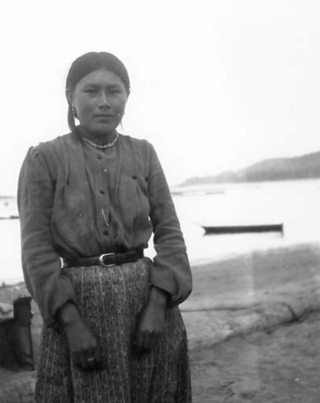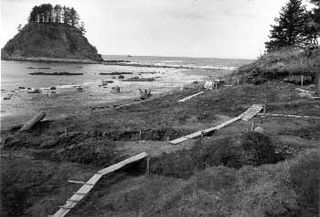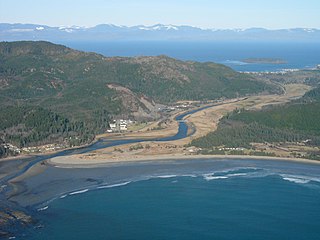
Neah Bay is a census-designated place (CDP) on the Makah Reservation in Clallam County, Washington, United States. The population was 935 at the 2020 census. It is across the Canada–US border from British Columbia. Europeans originally called it "Scarborough Harbour" in honor of Captain James Scarborough of the Hudson's Bay Company. It was changed to Neah in 1847 by Captain Henry Kellett. Kellett spelled it "Neeah Bay". The name "Neah" refers to the Makah Chief Dee-ah, pronounced Neah in the Klallam language. During the summer months, Neah Bay is a popular fishing area for sports fishermen. Another attraction is the Makah Museum, which houses artifacts from a Makah village partly buried by a mudslide around 1750. Many people also visit to hike the Cape Trail or camp at Hobuck Beach. An emergency response tug is stationed at Neah Bay which has saved 41 vessels since its introduction in 1999.

Moclips is an unincorporated community and census-designated place (CDP) in Grays Harbor County, Washington, United States. The population was 211 at the 2020 census. It is located near the mouth of the Moclips River.

The Shoalwater Bay Indian Tribe is a federally recognized Native American tribe in Pacific County, Washington, United States. The tribe is descended from the Lower Chehalis and the Willapa (Shoalwater) Chinook peoples. In 2016, the tribe had 373 enrolled citizens.

The Puyallup Tribe of Indians is a federally-recognized tribe of Puyallup people from western Washington state, United States. The tribe is primarily located on the Puyallup Indian Reservation, although they also control off-reservation trust lands.

The Makah are an Indigenous people of the Pacific Northwest Coast living in Washington, in the northwestern part of the continental United States. They are enrolled in the federally recognized Makah Indian Tribe of the Makah Indian Reservation, commonly known as the Makah Tribe.

The Quileute are a Native American people in western Washington state in the United States, with 808 enrolled citizens in 2018. They are a federally recognized tribe: the Quileute Tribe of the Quileute Reservation.

The Tulalip Tribes of Washington, formerly known as the Tulalip Tribes of the Tulalip Reservation, is a federally recognized tribe of Duwamish, Snohomish, Snoqualmie, Skagit, Suiattle, Samish, and Stillaguamish people. They are South and Central Coast Salish peoples of indigenous peoples of the Pacific Northwest Coast. Their tribes are located in the mid-Puget Sound region of Washington.

The Hoh or Chalá·at are a Native American tribe in western Washington state in the United States. The tribe lives near the Pacific Coast of Washington on the Olympic Peninsula. The Hoh moved onto the Hoh Indian Reservation, 47°44′31″N124°25′17″W at the mouth of the Hoh River, on the Pacific Coast of Jefferson County, after the signing of the Quinault Treaty on July 1, 1855. The reservation has a land area of 1.929 square kilometres and a 2000 census resident population of 102 persons, 81 of whom were Native Americans. It lies about halfway between its nearest outside communities of Forks, to its north, and Queets, to its south. The river is central to their culture. The main resources they used included cedar trees, salmon, and the nearby vegetation. They also traded and bartered with other tribes closer to Eastern Washington, near the Plateaus and Great Plains.

The Chimakum, also spelled Chemakum and Chimacum Native American people, were a group of Native Americans who lived in the northeastern portion of the Olympic Peninsula in Washington state, between Hood Canal and Discovery Bay until their virtual extinction in 1902. Their primary settlements were on Port Townsend Bay, on the Quimper Peninsula, and Port Ludlow Bay to the south.

Makah Reservation is an Indian reservation of the Makah Native Americans located on the northwestern tip of the Olympic Peninsula in Clallam County, Washington, United States. The northern boundary of the reservation is the Strait of Juan de Fuca. The western boundary is the Pacific Ocean. It has a land area of 121.451 square kilometres (46.892 sq mi) and a 2000 census resident population of 1,356 persons. Its largest community is Neah Bay.
The Lower Skagit are a tribe of the Lushootseed Native American people living in the U.S. state of Washington. Today they are enrolled in the federally recognized tribe, the Swinomish Indians of the Swinomish Reservation.
In Australia, Canada, New Zealand and the United States the term treaty rights specifically refers to rights for indigenous peoples enumerated in treaties with settler societies that arose from European colonization.

The Ozette Native American Village Archeological Site is the site of an archaeological excavation on the Olympic Peninsula near Neah Bay, Washington, United States. The site was a village occupied by the Ozette Makah people until a mudslide inundated the site around the year 1750. It is located in the now unpopulated Ozette Indian Reservation.
The Quinault Treaty was a treaty agreement between the United States and the Native American Quinault and Quileute tribes located in the western Olympic Peninsula north of Grays Harbor, in the recently formed Washington Territory. The treaty was signed on 1 July 1855, at the Quinault River, and on 25 January 1856 at Olympia, the territorial capital. It was ratified by Congress on 8 March 1859, and proclaimed law on April 11, 1859.

The Waatch River is a stream on the Olympic Peninsula in the U.S. state of Washington. It originates in the northwestern Olympic Mountains and empties into the Pacific Ocean through Makah Bay. The name "Waatch" comes from the Makah village name /waʔač'/, said to mean "bundling up cedar to make a torch".
Makah Air Force Station is a closed United States Air Force General Surveillance Radar station. It is located 2.4 miles (3.9 km) south of Neah Bay, Washington. It was closed in 1988 by the Air Force, and turned over to the Federal Aviation Administration (FAA).
Edward Eugene Claplanhoo was an American Makah elder and former chairman of the Makah Tribe, located on the northwest tip of the Olympic Peninsula in Washington state. Claplanhoo was the first Makah to earn a bachelor's degree. Claplanhoo was the chairman of the Makah during the excavation of the Ozette Indian Village Archeological Site in the 1970s. He is credited with keeping the artifacts uncovered at Ozette in Neah Bay. Under his leadership, the Makah Museum, which houses the Ozette collection, was established at Neah Bay in 1979. He also established Fort Núñez Gaona–Diah Veterans Park in Neah Bay in 2008.











